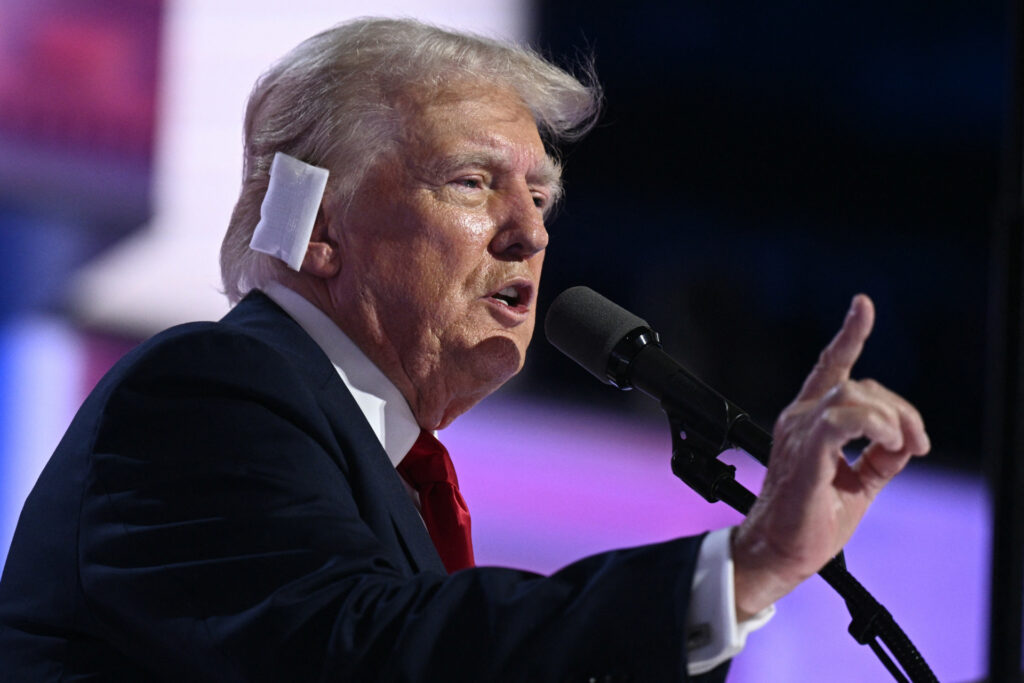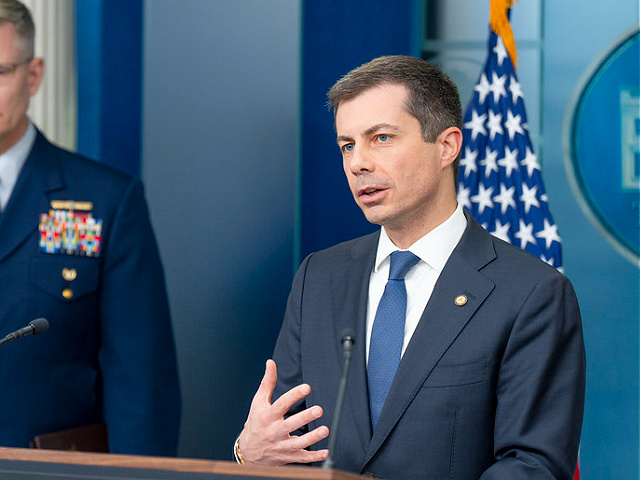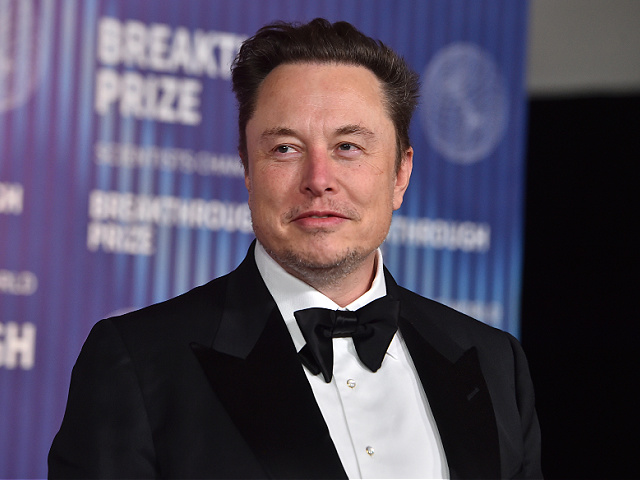
Pinkerton: Liquid Gold — Donald Trump’s Winning Message on Energy and Wealth
Republican presidential nominee former President Donald Trump and Elon Musk made plenty of news in their August 12 “X-cast.” Perhaps the most consequential statement was Trump’s assertion that “we have 100 to 500 years of oil left.”
The policy implications of those words are vast: We are not running out of energy. In fact, it is just the opposite.
In so declaring, Trump threatens to overturn a half-century of liberal orthodoxy: We have an energy crisis, also an environmental crisis, so we need to cut back. Not only that, we need bureaucratic overseers to tell us how to live our lives: Less meat. No more gas stoves. Use mass transit. Eat insects. And on and on.
Trump is so different from all that. He does not accept liberal/globalist pieties, no matter how many times they are repeated. We are reminded of just what a threat he poses to the status quo — and, so, we shouldn’t be surprised when the liberal/globalist establishment lashes back.
In fact, Trump has been talking about “energy dominance” for a long time. In his July 18 acceptance speech to the Republican convention in Milwaukee, Wisconsin, he took it to a new level, speaking of “liquid gold under our feet”: Oil.
U.S. former President and 2024 Republican presidential candidate Donald Trump speaks during the last day of the 2024 Republican National Convention at the Fiserv Forum in Milwaukee, Wisconsin, on July 18, 2024. (BRENDAN SMIALOWSKI/AFP via Getty Images)
If we are willing to use this abundance, Trump said — that is, if the anti-energy policies of President Joe Biden and Vice President Kamala Harris are vanquished — we will not only cut energy costs, and thus inflation, but “we will reduce our debt, $36 trillion.”
Yes, we have that energy wealth to pay down, even pay off, the national debt. According to the Institute for Energy Research (IER), technically recoverable oil resources in the U.S. total 2.136 trillion barrels. At the current price of $80 a barrel, that’s $171 trillion. Moreover, according to the IER, we have 3.391 trillion cubic feet of natural gas. That’s worth $165 trillion.
That’s an oil-and-gas total of $336 trillion. Then there’s coal; we have hundreds of trillions of that, too. Yes, we need to invest more in cleaning it up, but clean coal is a far better investment than windmills.
Trump is asking the American people: Do you want those hundreds of trillions of dollars energizing our economy, or do you want none of that? Would you rather wait for Transportation Security Pete Buttigieg to (some day) install an electric vehicle (EV) charger 50 miles from where you live?

Transportation Secretary Pete Buttigieg (Official White House Photo by Oliver Contreras via Flickr)
We’ve spent a century-and-a-half building our carbon energy infrastructure — all those refineries, storage tanks, pipelines, and filling stations — and it works well. Why would we want to try something new (with the government trying to do it) when we can have the tried-and-true?
Indeed, the strength of Trump’s pro-energy pitch is all the greater when we examine closely the anti-energy alternative. During the 2020 presidential campaign, Biden pledged to “end fossil fuel[s].” And, during his presidency, Just The News reports, the U.S. government reduced new oil and gas leases on its possessions by 95 percent.
That might make us think: Why does the federal government own so much territory? Wouldn’t it be better if the states owned it? In past decades, expanding state energy sovereignty has been a winning issue. More of that, please.
But, okay, Biden isn’t running again. So, let’s talk about Harris. As a loyal VP, she is a presumed supporter of all presidential policies. If she wishes to reverse those greenie positions, well, now’s her chance. After all, she has already disavowed the avant-green policies she embraced during her own short-lived campaign for the Oval Office in 2019.
In their X-show together, what did Musk make of Trump’s words in praise of carbon energy? Musk is, after all, the face of Tesla, the leading EV company, and EVs are typically seen as being part of the “green energy” coalition and so anti-carbon fuels.

Elon Musk (Jordan Strauss/Invision/AP)
Yet, Musk has a nuanced view of “climate change.” He told Trump that the current level of CO2 in the atmosphere, a little more than 400 parts per million (PPM, that’s 0.0004 percent) is not a crisis. If it gets up to 1000 PPM, he asserted, there’s a problem.
However, the earth is only adding about two PPM per year, Musk continued, so we have plenty of time to figure out a strategy. Musk said, “I don’t think we should vilify the oil and gas industry and the people that have worked very hard in those industries to provide the necessary energy to support the economy.”
Musk is thinking like a patriot (and a Texan), not a green. If the American economy is strong, as Trump has said, a certain fraction of the population will freely choose to buy EVs. So, Musk will do fine with Tesla, and, in the meantime, we’ll have the energy to do what Musk really wants: Go to space.
But, here, on earth, if we worry about too much carbon dioxide in the atmosphere, there’s a simple enough solution: Take the carbon out. Trees have been capturing carbon for eons, and we can do it, too, harvesting atmospheric carbon into everything from cement to plastics to nanotubes.
This would, in turn, lead to new carbon-based industries, for which there ought to be bipartisan support. In fact, back in 2019, this author headlined a piece, “How to Make Rural America Great Again,” outlining a vision of carbon-fuel production alongside carbon capture, entwined in a circular carbon economy. Encouragingly, the story was reposted by a thoughtful Democrat, Rep. Ro Khanna of California.
In the last five years, the case for carbon fuels has actually grown stronger, as we’ve come to realize that Big Tech, including artificial intelligence (AI), is its own kind of heavy industry, dependent on energy-ravenous data centers.

A vehicle is plugged into an electric vehicle charger on February 2, 2024, in Kennesaw, Georgia, near Atlanta. (AP Photo/Mike Stewart)
So, we see that super-energy consumers (tech, mostly in blue states) and energy producers (mostly in red states) need each other. Both sides should grasp the “Grand Carbon Bargain,” connecting the disparate regions in a new kind of national win-win.
In the meantime, more energy abundance is coming. Just on August 13, Chevron announced that its $5.7 billion project, Anchor, 140 miles off the coast of Louisiana, has ushered in a new era of deepwater production; the latest technology enables equipment to drill down nearly seven miles, withstanding pressures of 20,000 pounds per square inch. Chevron projects that its floating platform will produce 75,000 barrels of oil and 28 million cubic feet of natural gas a day. Reuters reports that another U.S. company, Beacon Offshore Energy, is poised to make a similar breakthrough.
Thanks to this American Can Do, we’ll be able to drill deeper everywhere, and we’ll get even more energy. So, those $336 trillion for American energy gold will be just the springboard for more wealth.
By the way, it’s not that the U.S. is uniquely blessed. Nearly 100 countries around the world produce oil, and we keep finding new fields all over — just in 2023, worldwide, 131 discoveries.

(magical_light/Getty Images)
The key to energy development anywhere in the world is a good political environment: A welcome to entrepreneurs, low taxes, less regulation — and no green strangulation. That doesn’t seem too much to ask for in return for energy abundance. Yet, as we have learned, plenty on the left wake up every day trying to figure out how to make the average American poorer as an offering to their green gods.
Trump is the antidote to this green zealotry. Indeed, Trump preaches a different kind of green. As he said in Milwaukee, “We are a nation that has the opportunity to make an absolute fortune with its energy.” Just on August 14, he upped the message, pledging that he would cut electricity bills by 50 percent or more. The only way to do that, of course, is by producing more energy — and that’s Trump’s pledge. If energy abundance and wealth for Americans are part of his steady message until November, he’ll win comfortably.
Originally Posted At www.breitbart.com
Stay Updated with news.freeptomaineradio.com’s Daily Newsletter
Stay informed! Subscribe to our daily newsletter to receive updates on our latest blog posts directly in your inbox. Don’t let important information get buried by big tech.
Current subscribers:








